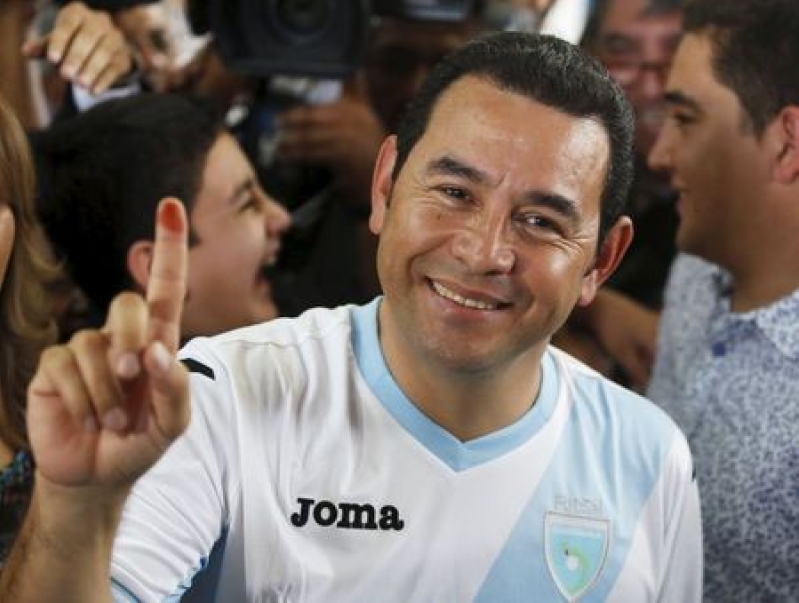
Jimmy Morales, a former TV comedian who has never held office, swept to power in Guatemala's presidential election on Sunday after milking public anger over a corruption scandal that deepened distrust of the country's political establishment.
The 46-year-old Morales overwhelmingly beat center-left rival and former first lady Sandra Torres in a run-off vote despite his lack of government experience and some policy ideas that strike many as eccentric.
The headquarters of Morales' center-right National Convergence Front (FCN) party erupted in celebration as official returns showed he had around 68 percent support in a landslide victory.
Voters pointed to widespread discontent with Guatemala's political class, compounded by a U.N.-backed investigation into a multi-million dollar customs racket that led last month to the resignation and arrest of former president Otto Perez.
"As president I received a mandate, and the mandate of the people of Guatemala is to fight against the corruption that is consuming us," Morales said on Sunday night.
The U.S. government has strongly supported the U.N.-backed investigators and their success has helped push against corruption in Central America, where economic hardship and gang violence spurred an exodus of migrants to the United States.
However, the anti-graft fervor has also led to the election of an unknown quantity in Guatemala. It is unclear how Morales will tackle gang violence or try to stem the flow of U.S.-bound migrants.
Morales was already a household name following a 14-year stint on a popular TV comedy and the self-proclaimed centrist from a humble background wooed voters with promises to tackle corruption and hand out millions of smartphones to children.
"We were tired of the same faces of people who get rich off our money," said Eduardo Tablas, a maintenance man who voted for Morales. "He knows that if he does something corrupt, all of Guatemala will be demanding that he resign."
Last year, Morales quit his TV show, which centered on skits and lewd jokes, to run for the presidency. Back in April, he barely registered in opinion polls but he soon surged as both Perez's government and a candidate who was then leading the presidential race became mired in corruption probes.
VOTER FRUSTRATION
Morales further targeted voter frustration with Guatemala's failing institutions by pledging to tag teachers with GPS devices to ensure they attend class.
He has also floated the idea of reviving a historic land dispute with neighboring Belize.
Such plans exposed Morales to ridicule from critics, and he also had to downplay ties between his FCN and the army, which was blamed for atrocities in Guatemala's 1960-1996 civil war.
Morales' rival Torres warned voters that the country needed experience, not a maverick. "Guatemala is not a comedy," she said during the campaign.
The election is a wake-up call to the impoverished Central American country's established parties, which have been shaken by investigations led by the Commission against Impunity in Guatemala (CICIG), the U.N.-backed anti-corruption body.
The CICIG's probe toppled Perez and has prompted calls for similar bodies elsewhere in Central America.
Morales, a former theology student with socially conservative leanings, has applauded CICIG's work and vowed to extend its remit. But now he will now face a test of just how honest he can make the government under the watch of the CICIG.
Morales said late on Sunday that he would not stand in the way of any probes of his own government. "Neither the president nor the vice president would be exempt," he said.
Still, he has given little detail on his plans to overcome entrenched corruption besides promising to put more money into justice, make government spending transparent and audit institutions.
Morales' manifesto was just six pages long, giving few clues as to how he might govern, and his FCN party will have just 11 out of 158 seats in the next Congress.
He will now face a test of just how honest he can make the government under the watch of the CICIG.
(With reporting by Sofia Menchu in Guatemala City and Dave Graham in Mexico City; Writing by Michael O'Boyle; Editing by Christian Plumb and Kieran Murray)






